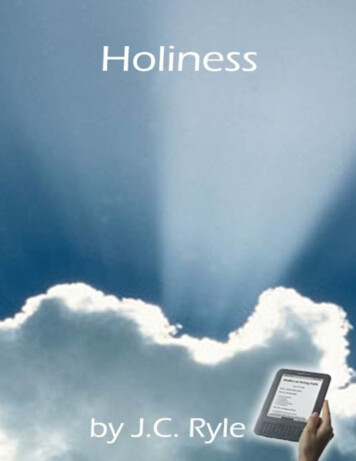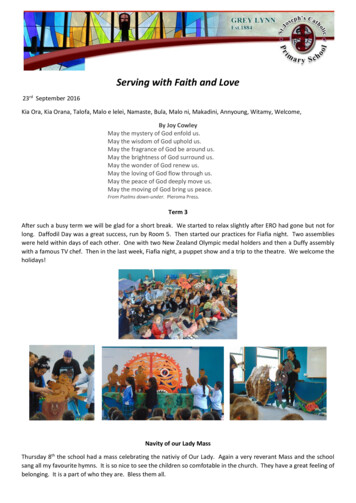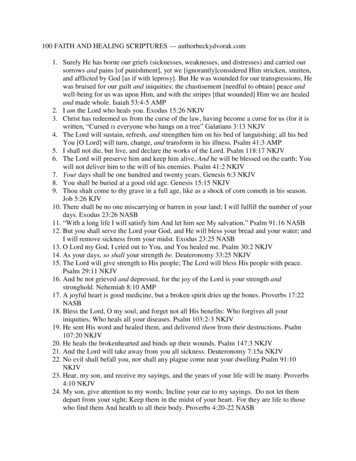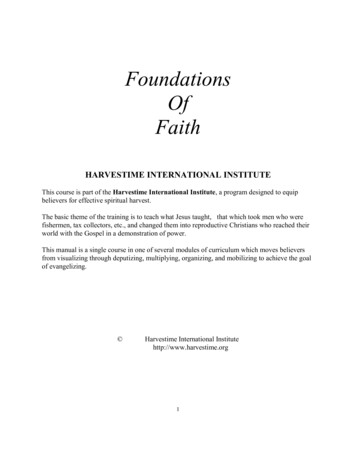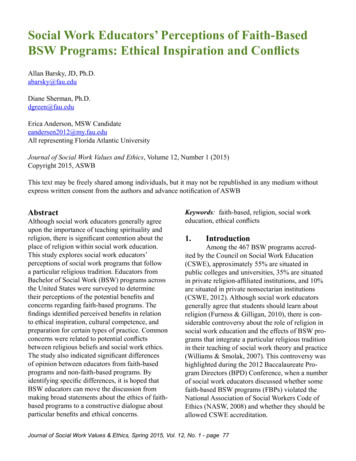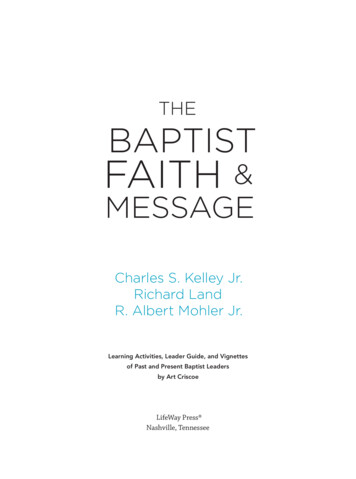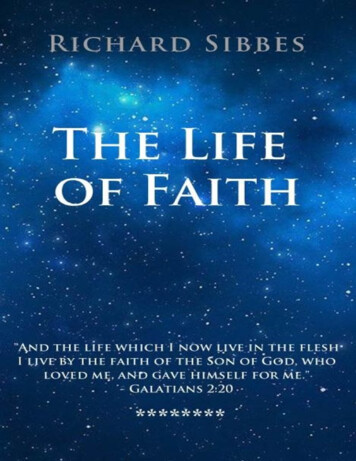
Transcription
The Life of Faithby Richard SibbesTable of ContentsThe life Which I Now Live in the Flesh I Live by Faith - Galatians 2:20 Sermon IThe life Which I Now Live in the Flesh I Live by Faith - Galatians 2:20 Sermon IISalvation Applied - Galatians 2:20 - Sermon IIITHE LIFE OF FAITHSERMON IAnd the life which I now live in the flesh I live by the faith of the Son ofGod, who loved me, and gave himself for me.—GAL. 2:20.THEY are the words of a man pursued by the law unto Christ, proceedingfrom the Spirit of Christ; the nature whereof is, to apply generals toparticulars. So St Paul here, 'The life which I now live in the flesh, I liveby the faith of the Son of God.' He sees he is dead by the law; therefore he
seeks for a better husband. The law finds him dead, and leaves him dead.Thus pursued by the tenor of the law, he flies to Christ, and says, 'I amcrucified with Christ,' nevertheless I live. How? 'Yet not I, but Christliveth in me.'There be three ranks of men in the world, under which all men may becomprehended.1. The estate of nature.2. The estate of men under the spirit of bondage.3. The estate of grace under the gospel.This is the speech of one of the third rank, of a man awaked by the spiritof bondage, who hath attained to a clear and evident sight of his misery,and of the excellent remedies, of a man who hath attained to a new frameand temper of soul. It is the speech of a person in the state of grace, whonow aspires to a more noble and excellent life. In the words we mayconsider divers things.1. That there is another manner of life than the ordinary life of nature.2. That it is a better and more excellent life than that he formerly lived; asif he had said, Now, since I have seen the misery of my former naturalestate, and the excellency of a spiritual life by faith in the Son of God, Iesteem my former life to have been wretched, not worthy of the name oflife, compared with that which I live now, as being founded in a betterroot than the 'first Adam.'3. The spring of this life is the Son of God. God is life naturally, and wehave life no otherwise than from him who quickeneth all things.4. The conveyance of this spiritual life is by faith. Water springs notwithout a conduit to carry and spread it. The sun warms not withoutbeams, and the liver conveys not blood without veins. So faith is thatvessel which conveys this spiritual life, that conduit wherein all spiritualgraces run, for the framing and working of spiritual life, conveying all, topitch upon those excellencies of the Son of God.
5. The object and root of this spiritual life is, faith in the Son of God,loving him, and giving himself for him.So there is a life besides the natural life, and the root of it is Christ, who isour life. Life is the best thing in the world, most esteemed of us; as thedevil said concerning Job, 'Skin for skin, and all that a man hath will hegive for his life,' Job 2:4. Life is the foundation of all comforts; life is thevigour proceeding from soul and body, So the spiritual life is nothing elsebut that excellent vigour, and strong connected strength of the soul andbody renewed, grounded on supernatural reasons, which makes it followthe directions of the word, over-master the flesh, and so by degrees betransformed into the image of Christ, consisting in holiness andrighteousness.Doct. The first point then is, that there is a better life than a natural life,because there is somewhat in a man which aspires and looks to a betterestate. A child in the mother's womb hath life and senses in that darkplace, but it is not contented therewith, but is restless as in a prison,tumbles and turns up and down; for this life that it hath is not to dwellthere, but a beginning-life to fit it to live in the more open and spaciousworld, whither it must shortly be sent forth. So in this dark life of oursthere is a divine instinct, power, and faculty in men, that nothing here cansuffice; which shews, that there is a place to satiate the will and theunderstanding, and fill the affections; that there is a condition whichshall make a man fully happy. That there must be a better life, which isthis spiritual life; for this life which we live in the flesh is a thing ofnothing. Our little life we live here, wherefore is it? To live a while, to eatand drink and enjoy our pleasures, and then fall down and die like abeast? Oh no, but to make a beginning for a better life. If this life be sucha blessing, what is then that most excellent spiritual life we speak of? Itholds out beyond all. By this spiritual life, when one is most sick, youshall see him most lively and spiritual. When sense, and spirit, and sight,and all fail, yet by reasons drawn from spiritual life he comforts himselfin Christ, the glory to come, and what he hath done for him. So theapostle shews the aim of a Christian is to be in sufferings of this life forthe increase of a better, 2 Cor. 4:10, saith he, 'Always bearing about in ourbody the dying of the Lord Jesus, that the life also of Jesus might be made
manifest in our body.' When the body is weakest, the spirit is strongest.Take a man who hath not this spirit and hope, he is à la mort* at theapprehension of death, because he hath no faith, no knowledge, noquickening life, no sense or taste of more excellent things; he knows notwhether there be a Holy Ghost or not: or if he be convinced in conscience,yet he is taken up with horrors, and fears condemnation at hand forevermore. Oh what are we without this life? Otherwise an heathen or aninfidel were as happy as we.A Christian furnished with this spiritual life can see Christ and glory,beyond all the things of this life; he can look backwards, make use of allthings past, see the vanity of things so admired of others; he can tastethings nature doth not relish; he hath strength of reasons beyond all theapprehensions of reason; he is a man of a strong working. This should stirus up above all things to get this spiritual life in us, lest, like St Paul'sliving dead widow, we be dead whilst we be alive, 1 Tim. 5:6. Therefore,unless we will be dead creatures, labour we must for a spiritual life, forthere is another death which follows the first death. We not only lose Godand Christ, life and glory, eternal life, communion with saints and angels,but also we come to eternal torments with the devil and his angels.Therefore above all things go we to Christ, that we may live in his sight.What is the reason we seek not more for this spiritual life? Because, whenthe conscience is not awakened, we think there is no such thing: likeJudas, walking on in the state of nature, in drunkenness, voluptuousness,covetousness, and the like, until we perish suddenly. If the conscience beawakened, oh then it is easy to work upon such a one who sees his miseryand desires the remedy. It was easy to persuade Jacob to send for corninto Egypt, when a famine was in the land of Canaan. It is easy topersuade men hungry and thirsty to eat and drink; easy to persuade aladen, weary man to lay down his burden and rest. So it is with us. If theconscience be awakened to have a sense of sin, and that intolerable wrathand eternal punishment due thereunto, we should and would long for thisspiritual life.I beseech you, let us believe there is such a life. Look 1 Pet. 1:3. There heblesses God, 'who hath begotten us again unto a lively hope by theresurrection of Jesus Christ from the dead.' None can go to heaven but
they who are begotten again here. The main help is the use of the means.This is that pool of Bethesda, at which if we lie the angel of the covenantwill put us in to be healed. Never rest then till this life be gotten in us.When we find such an antipathy betwixt our spirits and sin as is betweenpoison and them, then there is a beginning of the work. So we should hatesinful persons, whose conversations hinder the progress and increase ofour spiritual life. Those who venture on all occasions, no wonder they dofall in sinful courses. What is all their care and endeavour but to draw oneinto sin? They care for their lusts, and never think of any more. AChristian will care most for the nourishing of his best life, knowing thatgood and bad company do, the one quicken, the other dead him.Christ is called life, the bread of life, tree of life, and he gives us livingwater to refresh our souls, not that he is so essentially bread, or a tree,but by the efficacy of his working in us. For God is life in himself.Therefore he swears by it: 'As I live, saith the Lord, I desire not the deathof a sinner,' Ezek. 33:11. We consider not here of life so high, though thislife must be derived from him principally. It is so naturally. The Son is thefountain of life, because he is God, who is radically, fundamentally, andessentially life.But before Christ be fitted to be life for us, he must be man first, as John6:55, 'For my flesh is meat indeed, and my blood is drink indeed.' And thereason why he so quickens is, because he is also God, being that breadwhich came down from heaven, of which 'whose eateth shall live for ever.'Now this great work of our salvation being of necessity to be performedby an infinite person as God, who could not die, he therefore took uponhim a mortal nature, to open a current to mercy and justice. Therefore hisflesh is meat indeed; but the flesh profiteth nothing without the Spiritwhich quickens; for there must be a Spirit to seal up all this unto us. Aswithout shedding of blood no forgiveness of sins, so without the Spiritsealing these things unto our souls, we can have no comfort of them.When we speak of spiritual life, he it is that we live for; by him, and inhim, and through him we live. Therefore, 1 Cor. 15:45, 'the last Adam iscalled a quickening Spirit,' because by that Spirit he quickened himself,and quickens us now to live the life of grace, and shall hereafter quickenour dead bodies at the resurrection. So he is called 'the Sun of
righteousness,' for light and heat, because, as the sun lightens and warms,so he is the light of the world, as John speaks, 'lighting everything whichcometh into the world,' John 1:9, warming also and cherishing the massof things, and therefore is called light and life.Thus have we seen briefly there is another life than the life of nature; thatthis is a most excellent life; and that the root and spring of it is the Son ofGod. Now the way of conveyance of this life is 'by faith.' A fountain is notsufficient to send forth water abroad; there must be pipes to convey it foruse. So from the heart and liver there must be arteries and veins for themaintenance of life and conveyance of blood through all the body. Christis the heart and liver of all spiritual life; but there must be a conveyanceto bring it to us, and this is faith. But why is faith the grace to convey lifeto us?(1.) Because we are saved now out of ourselves by another. Therefore thatgrace which brings us to this great good must lead us out of ourselves.This faith doth, which is the hand of the soul, to lay hold of all the graces,excellencies, and high perfections of Christ.(2.) Because faith gives all the glory to the party* on whom it relies onand trusts, as Rom. 3:26. Paul shews why works were excluded; and sucha righteousness was brought in, saith he, that he might be just, and thejustifier of him which believeth; and then he adds, 'Where is boastingthen? It is excluded. By what law? Of works? Nay, but by the law of faith.'If by love it had come, or humility, patience, or anything in us, someboasting might have been; but this looks another way, lays hold uponanother's riches. Faith acknowledgeth nothing to be at home; therefore itgoes to another to fetch it, which else it would not do.(3.) Because we must be brought back again to God by a contrary waythan that we were lost by; for the same way we could never haverecovered. The serpent, we know, shaked Eve's faith in believing thethreatening. Whilst they kept the word and feared the commandment,they kept their life; but, losing this awful respect, they lost communionwith the fountain of love. So we fell by infidelity, and must return againby faith in the righteousness of another.
By this time we are come to the main thing intended, how we live by thefaith of the Son of God. We shall not haply reach the depth of so profounda mystery; only I will endeavour to give you some few heads, whereinfaith principally exerciseth her powers and functions.1. The life of faith is exercised in our effectual calling.2. In the state of justification, whence comes reconciliation.3. In a vigorous life, arising on the comfort of our justification.4. In our sanctification; in those supplies faith finds out to make up theimperfection thereof.5. The life of faith in glorification.6. We live by faith in all the several passages of this life, as we shall seewhen we come to them.Thus we live continually by the faith of the Son of God, and so we mustlive till we come to heaven.1. We live the life of faith in our effectual calling. The Spirit works it, theSpirit is God's hand. This makes, that our eyes are bent upwards to see abetter life, to see a calling, to live holily and righteously in all things, tosee what a rich means is provided to reconcile God and man, to satisfyjustice, and so to draw us in a new way and course of life, to rely on God,and look unto him in all our actions. Then the grace of union is given.God's Spirit works our hearts by this faith, to have first union, and thencommunion with God. Thus the soul being seasoned, and seeing theexcellency and necessity of another new life, touches Christ, and begins tolive the life of faith in effectual calling; for at first we are dead andunlovely creatures, estranged from grace and gracious actions, until, inthis estate, Christ is discovered by the Spirit, and faith to unite us to him.2. Secondly, We live the life of faith in justification. This is a life ofsentence that the soul lives by, peace being spoken unto it by the pardonof sin; for God by his Spirit doth report so much to the soul, giving usassurance that Christ our surety and peace-maker is raised up again. So
Eph. 2:5, it is said, 'Even when we were dead in sins, he hath quickenedus together with Christ, and raised us together, and made us sit inheavenly places with him.' And why? Because our Surety hath paid ourdebt. We say of a man condemned, he is a dead man till he have a pardon,which when he hath obtained, we turn our speech, and say, he lives. So injustification: being united unto Christ, and believing our pardon, we aresaid to live. Our sins lie on him as our surety; for then, as our husband incharge, he doth pay all our debts. Thus by virtue of our marriage toChrist, he discharges all our debts, and goeth away with them; even as thescapegoat in the wilderness went quite away with all the sins andiniquities of the people, never to return again. Look we therefore to oursins, the curse and wrath due unto them, and all as laid on him. Look atwhatsoever is good in him, that is for us; whatsoever is evil in us, look inhim for it, to have it taken away, pardoned, and not imputed.As we sin daily, so Zech. 13:1, 'There is a fountain daily running, to washaway sin and uncleanness.' Therefore for our daily sinning, we mustcontinually run and bathe our souls in this blood, apply the comforts ofhis sufferings, intercession, and obedience unto us. St John teaches usthus much; saith he, 'If any man sin, we have an advocate with theFather, Jesus Christ the righteous, and he is the propitiation for our sins;and not for ours only, but also for the sins of the whole world,' 1 John 2:1.If we sin daily, he justifies the sinner daily: he came to save sinners:therefore, when sin stirs us up to run from God, we should run to him.Faith says, 'There is no condemnation to them that are in Christ Jesus,'Rom. 8:1. Why? My sin was condemned in Christ, and a condemnedperson hath no voice. Christ came to destroy sin, and condemned sin inthe flesh. Our sins were crucified with him, and are now all condemnedsins, if we will go unto Christ, who hath borne all our iniquities, as theprophet Isaiah excellently shews.* Therefore St Paul triumphantlydemands the question, 'Who shall lay any thing to the charge of God'select? It is God that justifieth, who is he that condemneth?' Why? 'It isChrist that died, yea rather, that is risen again, who is even at the righthand of God, who also maketh intercession for us. Who shall thenseparate us from the love of Christ?' Rom. 8:33, 34. So in our daily sinsyou see we have use of these things, to have, upon our confession, a dailypardon of course taken out every day. Thus God would not have us sink.
So long as there is matter of guilt in us, God will have a way to cleanse oursouls, and renew our comforts. Every day we run into new debts, andevery day in the Lord's Prayer we are taught to ask pardon, and to rununto God, to have the book crossed out with his blood. Every day aChristian must eye the brazen serpent, I mean the Lord Jesus, signifiedthereby; he must sprinkle his heart with the blood of Christ, that thedestroying angel may pass by him in the day of wrath, as the Israelitesthen did. This is it to live by faith; every day to sue out our pardon; tolook unto our advocate and surety, who hath paid our debts, andcancelled that obligation against us, contrary to us, as the apostle speaks,daily to wash in that ever-running fountain. 'Christ is a priest for ever,after the order of Melchisedec,' Ps. 110:4. Though the act be past, heremains the same still. What puts down our courage, strikes us withterror and fear, but our sins? Oh, but why is this brazen serpent lifted, butthus to wash away our daily frailties and failings, so as whosoeverbelieveth in him should not perish, but have everlasting life? John 3:14,15.So justification is not only a sentence of pardon, but it is also, as Rom.5:15, a title to life everlasting: 'For if by one man's offence death reignedby one, much more they which receive the abundance of grace, and of thegift of righteousness, shall reign in life by Jesus Christ.' Where Godpardons, he advances. So if Satan shall come to shake my title, to shakethis faith, assure him that Christ came to save sinners. If he object, thytitle is naught and stained, being thou hast so many sins and corruptionsabout thy mortal body, answer him, What serves my faith for but for mycomfort, to shew me that my title is in Christ? my strength and ground ofcomfort is in him, not in myself. See one parallel example, how Davidlived this life of faith in justification: 'If thou, O Lord, shouldst markiniquities, who shall stand?' Ps. 130:3. There he pronounces death onhimself ere he be acquitted, and so must we in the like case. But thencomes the appeal: 'But mercy is with thee, that thou mayest be feared.'Enlarge it yourself. If a man be not sound in this point, all he does isnothing. This is all in all. Our sanctification without this is nothing. Thisis the ground of all. Be careful of this, to look to Christ's obedience, life,death, and sufferings, and those comforts flowing from our interesttherein.
But to direct you a little further ere we leave this sweet point.First, Look back every day unto the passages thereof. See how we havepassed along, see what sins have escaped thee; then come at night to God,confess and be sorry for all, resolve against all, crave strength against all.Oh it is a fearful state to sleep in sin; better sleep in a house full of addersand venomous beasts. See also and watch every morning; corruption dothcleave to all our best actions; we pass no day so, but we have cause to say,Lord forgive us our sins. By this course we shall keep our souls free, beingready for death. We shall by our particular reckoning, every day clearingthe score, be ready for our great general pardon, and when trouble comes,have only that to encounter with. I beseech you, therefore, put this inpractice. Be sure with the day to clear the sins of that day; so shall ye livea comfortable life, and be fit for all estates, for life, for death, for sickness,trouble, or whatsoever, all our business lying in heaven then.Obj. If it be thus, we need not care how we sin: it is but every day to sueout a new pardon.Ans. Oh beware; ere our pardon be sealed, there must be confession,sorrow for sin, resolution with full purpose to do so no more; there mustbe arraigning, condemning, and judging of ourselves for it, becausewhatsoever we would not have God to do, we must do it ourselves. Ourtime in getting this quietus est sealed, is for the most part according toour sin. He that hath such a resolution to sin every day, because sin isevery day pardoned, he may go long enough without pardon, at leastcomfort of his pardon. For though pardon of sins be pronounced, yet Godhath the keeping of joy in his own hand. As David had his sin pardoned,—by the judgment of faith he knew thus much—yet Ps. 51:8, how doth hepray for joy, and that God would heal the bones which he had broken! Heroared all the day, and still felt a pain like the breaking of bones. The joyof the Spirit had left him. This he cries to have restored. Thus though sinmay be pardoned, yet the more we sin, the more hardly we shall repent,the longer we shall want joy; or, it may be, go all our lifetime mourningwithout comfort in such a case. Now let us see how it may be known thatwe live the life of faith in justification.Trial 1. First, By trying how it comes in the soul; as Rom. 7:4, saith the
apostle, 'Wherefore, my brethren, we also are become dead to the law bythe body of Christ; that ye should be married to another, even to him whois raised from the dead, that we should bring forth fruit unto God.' After aman is dead by the law, and apprehends himself slain, then he comes tolive this life of faith. Christ quickens none but the dead. Why do not thepapists attain to this grace of justification? They never see themselveswholly dead, but join some life to the natural estate of man. ThereforeChrist quickens them not. Such only are quickened by him who findthemselves dead in the law. Then they come to have a holy despair, and tosee that life and comfort is out of themselves in another. Justificationsprings from a holy despair, and receiving life, after we have seenourselves dead.Trial 2. Secondly, Where this life of faith is, there is a wonderful highvaluing and prizing of Christ, his righteousness, merits, obedience, andwisdom of God in that way of forgiveness of our sins by this God-man, thewonderful mediator; as Philip. 3:8. Paul accounts all things 'but loss anddung for the excellency of the knowledge of Christ Jesus our Lord,' beingcontented to suffer the loss of all things to win Christ. It is the preciouspearl to sell all for. Paul accounts all our own righteousness as nothing inregard of this. There must be a high estimation of the riches of Christ'sobedience and sufferings: for where there is not this high estimation of it,they are rotten in the point of justification. But you see how Paul sets atnought and vilifies all things in regard thereof; so Rom. 4:16. Abraham isbrought in to be justified by grace, to the end the promise might be sureto all the seed. And Ps. 32:2, he is pronounced to be the blessed man,'unto whom the Lord imputeth not iniquity, and whose sin is covered.'Trial 3. Thirdly, When we have a zeal against all contrary doctrine, as StPaul shews to the Galatians, who would have joined works to faith: 'Christis become of none effect unto you; whosoever of you are justified by thelaw, you are fallen from grace,' Gal. 5:4. And in the third chapter he says,'O foolish Galatians, who hath bewitched you, that you should not obeythe truth, before whose eyes Jesus Christ hath been evidently set forthcrucified among you?' 'This only would I learn of you, received ye theSpirit by the works of the law, or by the hearing of faith?' Gal. 3:1, 2. Aman sound in the point of justification hath a hatred to popery, and all
such doctrine which impairs the riches of the grace of Christ. Death is inthe Romish religion. Why are some of them then saved? Not because theydie in that religion, but because they reverse their judgment in this pointof justification.* So you see there is a hatred, a zeal in such, as St Paul hadagainst contrary doctrines.Trial 4. Fourthly, There is peace and joy settled in the heart: as Rom. 5:1,2, 'Therefore being justified by faith, we have peace with God through ourLord Jesus Christ: by whom also we have access by faith into this gracewherein we stand, and rejoice in the hope of the glory of God.'Quest. To add one thing more ere I leave this point, In the case of relapse,what shall we do then? Are we not cut off? Must we not have a newincision?Ans. I answer, Every man who falls does not fall on all-four, fall awayquite. There be degrees of falling; as in a sick man, though ill, he is not byand by dead. Some life and strength remains, which works out towardshealth again. There is so much grace and life in justification left, as torecover him again. But as in other cases, so in relapses also, a man mustlive by faith. We see, 2 Cor. 5:20, even such as were in the state of grace,are entreated to be reconciled. Though we fall, we must not therefore falloff, but stir up grace, and recover ourselves again. So Isa. 55:7, there it issaid, 'Let the wicked forsake his way, and the unrighteous his thoughts:and let him return unto the Lord, and he will have mercy upon him, andto our God, for he will abundantly pardon.' And then he adds the reason,'For my thoughts are not your thoughts, neither are your ways my ways,saith the Lord. For as the heavens are higher than the earth, so are myways higher than your ways, and my thoughts than your thoughts.' SoJer. 3:1, 'They say, If a man put away his wife, and she go from him, andbecome another man's, shall he return unto her again? Shall not the landbe greatly polluted? But thou hast played the harlot with many lovers; yetreturn again to me, saith the Lord.' Thus we must live by faith, for all ourslips and falls, yet not to let go our hold, but still run to the horns of thisaltar, still fly to this city of refuge, and so we shall be safe.Quest. But what is the reason that many who are justified yet find notdaily comfort?
Ans. Perhaps they daub up† themselves, and do not search the bottom oftheir corruption: as Ps. 32:3, David, when he kept close his sin, his boneswaxed old through his roaring all the day long, and God's hand was heavyupon him day and night. Then he shews how he found comfort: 'Iacknowledged my sin unto thee, and mine iniquity have I not hid. I said Iwill confess my transgressions unto thee; and thou forgavest the iniquityof my sin.' So it may be in this case. We come not off with God freely, wedo not ransack our sins, we search not all the corners. Sin is a marvelloussubtle thing. Again, thereby many times God will humble us for a formersin, and keep off comfort, until we be more humbled, and stand in awe ofsin.3. Thirdly, Hence springs a vigorous life. A life of cheerfulness, when aman hath his pardon sued out, then comes life and joy, strength of holyactions well rooted and grounded. Who should joy, if a triumphantrighteous person should not? Who have cause to rejoice more than kings?By justification we are made kings and priests, are lifted above all sinsand lusts, world and devil; have a right and title to heaven. Shall a carnalman joy in his titles and privileges, and shall not we much more, beingsons of God by adoption, and heirs of all things? So Rom. 5:1: 'Beingjustified by faith, we have peace with God, and joy in tribulation.' Beingonce justified, the sting of all troubles is taken away. God is ours. We joyin God. This is all in all. The blood of Abel, that cries for vengeance; butthe Spirit of God in this estate tells me, that the blood of Christ speaksbetter things, mercy, mercy; in his blood is always comfort, though we beweak and unskilful to apply it. The washing in this blood should make aChristian walk on cheerfully in the comforts of the Holy Ghost. But Ihasten to the next, which is,4. Fourthly, The life of faith in sanctification. This springs from thesegrounds:(1.) First, Faith lays hold on Christ, as God offers him. How is this? See 1Cor. 1:30: 'But of him are ye in Christ Jesus, who of God is made unto uswisdom, and righteousness, and sanctification, and redemption.' Godgives Christ, not for justification only, but sanctification also: and thusfaith must apprehend him.
(2.) Faith receives him as whole Christ in all his offices; not as a priest tosave only, but as a king to rule; as a wife receives her husband, to begoverned and ruled by him.(3.) Again, Christ came not only to take away the guilt of sin, but thedominion of sin. He came, as John speaks, to destroy the whole work ofthe devil; as it is said, Eph. 5:25, 26, 'He gave himself for his church, thathe might sanctify and cleanse it with the washing of water by the word,that he might present it to himself a glorious church, not having spot orwrinkle, or any such thing, but that it should be holy and withoutblemish.' Christ doth purge his church, not only from the guilt of sin, butalso from the meddling and polluting of itself in the world with filthythings. So Rom. 8:3, the apostle shews, that 'God sending his own Son inthe likeness of sinful flesh, and for sin, condemned sin in the flesh: thatthe righteousness of the law might be fulfilled in us, who walk not afterthe flesh, but after the Spirit.' He came as well by water as by blood.Therefore faith puts him on, not only by justification, but also insanctification. To clear this.[1.] Upon justification of necessity comes sanctification. For what is thestop of God's mercy? His anger for sin committed; in which case hedenies his Spirit. But with reconciliation there comes also the Spirit: asEphes. 1:13, saith the apostle, 'In whom also, after that ye believed, yewere sealed with that Holy Spirit of
The life Which I Now Live in the Flesh I Live by Faith - Galatians 2:20 - Sermon I The life Which I Now Live in the Flesh I Live by Faith - Galatians 2:20 - . , that we may live in his sight. What is the reason we seek not more for this spiritual life? Because, when the conscience is not
